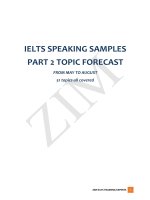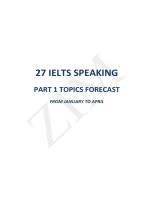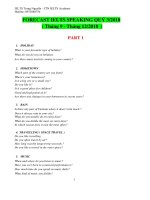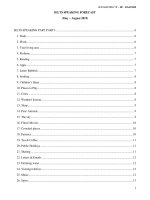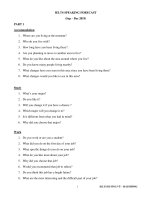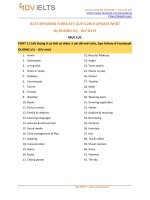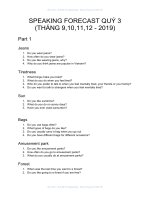Speaking forecast q1 2023
Bạn đang xem bản rút gọn của tài liệu. Xem và tải ngay bản đầy đủ của tài liệu tại đây (4.87 MB, 208 trang )
IE LTS
SPEAKING
Actual Tests With
Suggested Answers
Febraury - March 2023
TARGET SERIES
Preface
As far as you know, IELTS candidates will have only 11-14 minutes for IELTS
Speaking and it comprises Part 1, Part 2, and Part 3. Therefore, it is absolutely
necessary that you invest time in practicing the real IELTS Speaking
questions.
Besides the Cambridge IELTS Practice Tests series published by Oxford
University Press, IELTS Speaking Recent Actual Tests with Suggested Answers
aims to develop speaking and test-taking skills along with language
proficiency to help you achieve a high IELTS Speaking score. It contains IELTS
Speaking questions that were asked and would be asked in IELTS Speaking
tests in 2022. The questions are divided into parts 1, 2, and 3. Each question
has answers provided by a certified IELTS expert along with the vocabulary
specifically used for that question/topic. When using this e-book, you can be
aware of the kinds of questions that you would face in a real exam, and how
the answers are framed accordingly.
Moreover, these tests are extracted from an authentic IELTS bank source;
therefore, you are in all probability to encounter these questions in your real
examinations.
The authors are convinced that you will find IELTS Speaking Recent Actual
Tests with Suggested Answers beneficial on your path to success with the
International English Language Testing System.
Don’t just trust luck in your IELTS exam – the key is practice!
Table of Contents
Table of Contents
3
Introduction
1
➔ Part – 1
1
➔ Part – 2
1
➔ Part – 3
1
Vocabulary
1
Part 1
2
Headphones
2
Sample Answers
2
Vocabulary
4
Advertisement
5
Sample Answers
5
Vocabulary
7
Watch
9
Sample Answers
9
Vocabulary
12
Collecting Things
13
Sample Answers
13
Vocabulary
15
Street Market
16
Sample Answers
16
Vocabulary
16
Bicycles
19
Sample Answers
19
Vocabulary
22
Dictionaries
23
Sample Answers
23
Vocabulary
26
Evenings
27
Sample Answers
27
Vocabulary
29
Going Overseas
30
Sample Answers
30
Vocabulary
32
Phases/Stages of Life
33
Sample Answers
33
Vocabulary
35
SMS/Text Messaging
36
Sample Answers
36
Vocabulary
39
Apps
40
Sample Answers
40
Vocabulary
41
Jokes & Comedies
43
Sample Answers
43
Vocabulary
46
Singing
47
Sample Answers
47
Vocabulary
48
Being Tidy
50
Sample Answers
50
Vocabulary
52
Home/Accommodation
54
Sample Answers
54
Vocabulary
57
Window view
58
Sample Answers
58
Vocabulary
60
Being Happy
62
Sample Answers
62
Vocabulary
63
Trees
65
Sample Answers
65
Vocabulary
68
Stages of Life
Sample Answers
Vocabulary
69
69
71
IELTS Speaking – Part 2 & 3
73
Part 2 - Foreign Culture
73
Sample Answer
73
Vocabulary
74
Part 3 - Foreign Culture
Vocabulary
77
78
Part 2 - Well Known Person
80
Part 3 -Sample Answer
80
Vocabulary
Part 3 - Well Known Person
Vocabulary
Part 2 - Skill
82
83
85
86
Sample Answer
86
Vocabulary
87
Part 3 - Skill
Vocabulary
Part 2 - Song
89
91
93
Sample Answer
93
Vocabulary
95
Part 3 - Song
Vocabulary
96
97
Part 2 - Concentration
99
Sample Answer
99
Vocabulary
100
Part 3 - Concentration
Vocabulary
Part 2 - Trip
102
103
104
Sample Answer
104
Vocabulary
105
Part 3 - Trip
Vocabulary
107
108
Part 2 - Book
110
Part 2 - Broke Computer
126
Sample Answer
126
Sample Answer
110
Vocabulary
111
Part 3 - Book
Vocabulary
Part 2 - Boring Time
112
113
114
Sample Answer
114
Vocabulary
116
Part 3 - Boring Time
117
Vocabulary
118
Part 2 - Puzzle
119
Sample Answer
119
Vocabulary
122
Part 3 - Puzzle
123
Vocabulary
125
Vocabulary
Part 3 - Broke Computer
128
129
Vocabulary
130
Part 2 - Medicine
131
Sample Answer
131
Part 3 - Medicine
135
Vocabulary
136
Part 2 - Opinion
137
Sample Answer
137
Vocabulary
140
Part 3 - Opinion
Vocabulary
141
142
Part 2 - Conversation
143
Sample Answer
143
Vocabulary
144
Part 3 - Conversation
Vocabulary
Part 2 - Apology
146
147
149
Sample Answer
149
Vocabulary
151
Part 3 - Apology
Vocabulary
Part 2 - Revisiting Book
Sample Answer
153
154
156
156
Part 3 - Revisiting Book
160
Vocabulary
161
Part 2 - Repairing
162
Sample Answer
162
Vocabulary
164
Part 3 - Repairing
166
Vocabulary
167
Part 2 - Free Gifts/Things
169
Sample Answer
169
Vocabulary
170
Part 3 - Free Gifts/Things
172
Vocabulary
173
Part 2 - Childhood
174
Sample Answer
174
Vocabulary
175
Part 3 - Childhood
178
Vocabulary
180
Part 2 - Stranger
182
Sample Answer
182
Vocabulary
183
Part 3 - Stranger
185
Vocabulary
187
Part 2 - New Year
189
Sample Answer
189
Vocabulary
190
Part 3 - New Year
192
Vocabulary
193
205
Part 3: Share with Others
Vocabulary
235
236
Part 2: A Film or Movie
238
Sample Answer
238
Vocabulary
239
Part 3: A Film or Movie
Vocabulary
Part 2: A Plan
240
241
243
Sample Answer
243
Vocabulary
244
Part 3: A Plan
Vocabulary
Part 2: Street Market
Sample Answer
245
247
248
24
1
1
Introduction
The Speaking test comprises 3 parts and is conducted by an examiner for 11-14
minutes. This test is similar to an interview and thus the emotions attached to
the test are also similar – jitters, scary, and anxiety. This is where the IELTS
Speaking book comes in.
This book helps you to understand the unfamiliar, so let’s dive in!
➔ Part – 1
Most of part one questions are personal questions that the examiner will ask
you to bring you into a comfort zone. These questions are sorted in terms of
different personal information.
➔ Part – 2
The second part consists of a cue card for which you will be given 1 minute to
prepare and 2 minutes to talk. The questions in the cue card are addressed
and a sample answer is given for the cue card.
➔ Part – 3
Following the cue card are part 3 questions. Part 3 of the speaking book
consists of questions related to the cue card you will receive. And so, these
questions are found with sample answers below the related cue cards.
Vocabulary
Lexical resources are factors of assessment during the speaking tests. So,
below each of these topics, you will find a vocabulary section that contains
words related to that particular topic along with examples.
Happy practicing!
2
To Access the Speaking Part 1 Audios, Scan the
QR Code.
3
Part 1
Headphones
The examiner asks you about yourself, your home, work, studies and other
familiar topics. You should speak in short sentences while answering task 1
questions.
Questions
1.
Do you use headphones?
2.
What type of headphones do you use?
3.
When would you use headphones?
4.
What do you use headphones for?
5.
In what conditions will you not use headphones?
● Click here for the speaking audio of this answer
Sample Answers
1. Do you use headphones?
Yes, I use headphones on a daily basis while I work or study and also when I
watch movies during my leisure time.
4
2. What type of headphones do you use?
As I have to multi-task and wired headphones tend to intertwine easily,
Bluetooth or wireless headphones are my favorites. Although they are pricey
compared to wired ones, they are cost-effective as well as hassle-free.
3. When would you use headphones?
Actually, I have two sets of Bluetooth headphones. One of them is an in-ear set
which I use during exercising at the gym. The other one is an on-ear set which I
use mainly for work, listening to music or movie-watching.
4. What do you use headphones for?
My headphones have a noise-cancellation feature which helps me focus on
whatever I am doing. Secondly, in public places I can use them nonchalantly
without disturbing others with whatever I am listening to. Moreover, as they are
wireless, I do not have to hold my phone in my hand and use my hands to the
fullest.
5. In what conditions will you not use headphones?
Using headphones continuously can be detrimental to our ears. So, I take
breaks after prolonged usage. Also, I don’t use headphones when I am in the
kitchen or outdoors to be mindful of my surroundings and thwart accidents.
5
Vocabulary
1. Intertwine
Meaning: connect or link (two or more things) closely.
E.g.: The electric wires are intertwined in such a way that it is difficult to
separate them.
2. Pricey
Meaning: having a high price; expensive
E.g.: “Don’t you think the food in this restaurant is pricey?”, said my
mother.
3. Nonchalantly
Meaning: in a casual way that shows a relaxed lack of concern or interest
E.g.: The man walked out of the office nonchalantly even after the big
fight.
4. Detrimental
Meaning: causing harm or damage
E.g.: Pollution is detrimental to humans as well as the surroundings.
5. Thwart
Meaning: prevent (someone) from accomplishing something
E.g.: The police tried to thwart the attack, but were unsuccessful in
stopping them.
6
Advertisement
The examiner asks you about yourself, your home, work, studies and other
familiar topics. You should speak in short sentences while answering task 1
questions.
Questions
1.
Are you interested in watching TV advertisements or internet
advertisements?
2.
What kind of advertisements do you dislike?
3.
Are there many advertisements in your country?
4.
Why do you think there are so many advertisements now?
5.
Have you ever bought something because of its advertisement?
6.
Do you want to work in advertising in the future?
● Click here for the speaking audio of this answer
Sample Answers
1.
Are
you
interested
in
watching
TV
advertisements
or
internet
advertisements?
Honestly, I am intrigued by neither of them because they ruin my concentration
while I listen to or work on something. But, as I mostly use the internet for
study/work or to respite from my hectic life, I am more conversant with internet
advertisements.
7
2. What kinds of advertisements do you dislike?
All kinds of advertisements annoy me as they create a disruption in the activity
I am engaged in. But, I am mostly irritated by junk mails and website pop-ups
as they block essential information and I miss them out.
3. Are there many advertisements in your country?
Certainly, there are multiple advertisements for myriads of products and
services throughout all cities and villages in India. They appear all over the
place, from the streets to social media, with a high density. For example, there
are a multitude of colorful billboards stuck on the street side wherever you go.
4. Why do you think there are so many advertisements now?
I guess it’s due to the benefits of the companies. To begin with, advertisements
are the easiest way to reach customers to entice their attention to a particular
brand or product. From that tantalizing information, customers will be able to
choose an appropriate one. Besides, it also plays a paramount role in the
marketing strategy that the company applies to lure customers.
5. Have you ever bought something because of its advertisement?
Earlier, I used to be enticed by the sale advertisements of various e-commerce
websites like Amazon and Myntra, which resulted in lots of unwanted shopping
and turned me into a shopaholic. Fortunately, now, I have been able to control
my craze after getting an earful from my mother.
8
6. Do you want to work in advertising in the future?
Although advertisements bug most of us, it requires a lot of creativity and
research to make them comprehensible and relevant to the contemporary time
and market needs. Unfortunately, I lack that level of ingenuity and knowledge
and currently, it would be a travesty to consider myself eligible for that field. But
we never know what life brings us, and in the future, I might take up it as a
challenge if given the opportunit
Vocabulary
1. Respite
Meaning: a short period of rest or relief from something difficult or
unpleasant.
E.g.: The traveler wanted to have a respite from the heat of the desert.
2. Conversant
Meaning: having knowledge or experience
E.g.: Make sure you are conversant with the ways of the company before
the interview.
3. Tantalizing
Meaning: making you excited about having something wanted
E.g.: The surprise planned for my brother’s birthday had a tantalizing
effect on him.
4. An Earful
Meaning: to complain angrily to someone; scold
E.g.: Our principal gave an earful to the seniors after they misbehaved in
the annual function.
9
5. Ingenuity
Meaning: skill at working out how to achieve things or skill at inventing
new things.
E.g.: She is known for her ingenuity in work.
Student Space:
10
Watch
The examine asks you about yourself, your home, work, studies and other
familiar topics. You should speak in short sentences while answering task 1
questions.
Questions
1.
Do you have a watch?
2.
Have you ever gotten a watch as a gift?
3.
Why do some people wear expensive watches?
4.
Do you think it is important to wear a watch?
5.
What kind of watches do you like to wear?
6.
What was your first watch like?
● Click here for the speaking audio of this answer
Sample Answers
1. Do you have a watch?
With the advent of mobile phones, using a watch has become superfluous.
Therefore, even though I own some watches, I do not wear them often.
2. Have you ever gotten a watch as a gift?
My father, being a hobbyist of watches, has a vast collection ranging from
analog to digital and chronograph to hybrid. But he knows my insouciance to
his passion. So, keeping my affinity with modern tech accessories in mind, he
gifted me a smartwatch on my last birthday.
11
3. Why do some people wear expensive watches?
I guess, to most people, expensive watches are status symbols or fashion
accessories. They flaunt their class and power in the society or convey their
inclination toward sophistication. But, there are others who don luxury watches
as they are fervent about them, and one such example is my father.
4. Do you think it is important to wear a watch?
Wearing watches has lost its essence nowadays as everyone can afford
smartphones that serve the same purpose, along with lots more attributes.
Even if people wear watches, I feel it’s mostly for style or fixation rather than
necessity.
5. What kind of watches do you like to wear?
To be honest, I am not keen on watches, unlike my father. So, I guess even if I
have to choose a watch I would like to wear, it would definitely be a smartwatch
which has numerous advantages other than only time-keeping.
6. What was your first watch like?
As far as I can remember, I have owned only one watch, which is a smartwatch
gifted by my father. It is a Samsung Galaxy Watch and has some remarkable
features that come in handy, like call support, daily assistant, endurance and
good power backup. I really cherish and take good care of it.
12
Vocabulary
1. Superfluous
Meaning: being more than is needed, useful, or wanted; excessive
E.g.: One of my friends is very superfluous about his father’s business.
2. Hobbyist
Meaning: a person who pursues an activity in their spare time for
pleasure
E.g.: I have never seen a hobbyist so invested in their pastimes.
3. Insouciance
Meaning: lack of concern shown by someone about something which
they might be expected to take more seriously
E.g.: My sister’s insouciance on such grave matters was very irritating for
me.
4. Affinity
Meaning: a strong liking for or attraction to someone or something
E.g.: Boxer had an affinity to chase the neighborhood cats.
5. Fervent
Meaning: showing strong and sincere feelings or beliefs
E.g.: The superstar had many fervent fan following.
